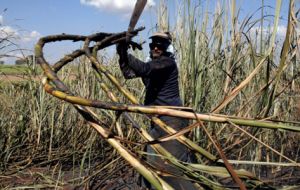MercoPress. South Atlantic News Agency
Brazil to the rescue of the sugar-ethanol industry with lower taxes and soft credit
 The content of ethanol in Brazilian gasoline will increase from 20% to 25%
The content of ethanol in Brazilian gasoline will increase from 20% to 25% The Brazilian government has come to the rescue of the sugar-ethanol industry announcing that as of next May first the mandatory content of ethanol in gasoline will increase from 20% to 25%, taxes on the sugar-cane fuel will be eliminated and there will be soft loans to keep expansion going.
Finance Minister Guido Mantega, who announced the measures, said he expected a recovery in the ethanol industry could also help curb stubborn consumer inflation by bringing down fuel prices and reducing Brazil's dependence on gasoline imports.
The reduction of the so-called PIS/Cofins, payroll and social security taxes, and interest rates on loans is expected to help ethanol groups offset production costs that have risen steadily in the last decade.
”The government measures will create better conditions for investment in expanding output (of ethanol),” he told reporters of the measures that have been in the works for the past months to revive the industry that Brazil pioneered in the 1970s.
Mantega also announced that 4billion Reais (approx 2 billion dollars) in soft credit will be earmarked for financing the coming sowing of cane and expansion of the planted area. Rates on the loans, which have now been opened to foreign owned companies, will fall to 5.5% from 8.5-9.5% last year.
The government will also extend 2bn Reais in credit to finance the storage of ethanol over the inter-harvest period (December-April) when prices typically spike due to tight supplies. Rates will fall to 7.7% from 8.7% presently.
The chemical industry was also included with a reduction in taxes which will cost the government 1.1bn Reais this year alone. Mantega said the tax cuts will help the local chemical industry better compete against companies in the United States that have seen their input costs dwindle.
Elizabeth Farina, president of Brazil's leading cane industry association Unica, said that the measures, which will cost the government 970 million Reais (480m dollars) in tax revenue this year, were “a step in the right direction” and “much welcomed.”
But Farina said the measures fall short of what the industry will need to resume the level of investments that flowed into new ethanol plants prior to 2009. The industry has long cried out for a clear government policy on the price of gasoline, the main competitor to ethanol on the Brazilian fuels market.
But the government has given no sign it will loosen its control of domestic gasoline prices as a tool against inflation. Consumer prices in the first quarter rose 1.94% which comes to an annualized 6.59%, out of target.
In effect after months of pressure and mounting losses at state oil giant Petrobras, the government agreed to allow a 6.6% increase in wholesale gasoline prices in January. However, analysts estimate local gasoline prices are still about 15% below international levels, allowing the petroleum-based fuel still to undercut ethanol's competitiveness.
A steady rise in production costs for the bio-fuel in the last decade has turned the industry's profits into losses and made more than 10% of Brazil's 380-some mills insolvent in the last few years. Since 2009, hydrous ethanol's share of the light vehicle fuel market has fallen from nearly 50-50 with gasoline to just over 30%, according to the National Petroleum Agency.
In all, the two measures would go a long way to soaking up the additional 4.6 billion litres of ethanol forecasters expect the record cane crop will yield this season, Itau BBA said. Brazil is in the initial stages of harvesting a record 580-590 million tons centre-south cane crop.
Mining and Energy minister Edison Lobao said that with the new ‘support package’ the ‘ethanol industry will consolidate in Brazil’ with an annual target production of 28bn litres.




Top Comments
Disclaimer & comment rules-

-

-

Read all commentsSubsidising petrol?
Apr 24th, 2013 - 08:20 am 0Way to go Brazil! Nothing screams 'don't innovate' like a subsidy.
# 1 - Subsidies for petrol? Obviously you didn't read the article. What is being implemented is a reduction of taxes to stimulate the ethanol industry.
Apr 24th, 2013 - 02:24 pm 0@2
Apr 24th, 2013 - 05:45 pm 0Please tell me WHO will pay for these subsidies:
1) The Government
2) The petrol industry
3) The sugar cane industry
4) The taxpayers
5) Nobody.
One answer only, please.
Commenting for this story is now closed.
If you have a Facebook account, become a fan and comment on our Facebook Page!